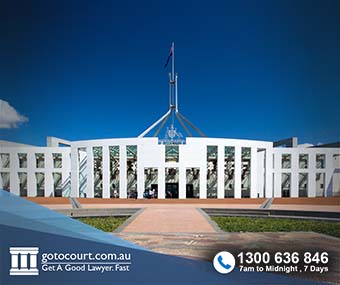Call our lawyers
now
or,
have our lawyers
call you
Espionage and Foreign Interference Bill Passes Senate
Updated on Jun 28, 2018 • 5 min read • 223 views • Copy Link
Espionage and Foreign Interference Bill Passes Senate
The National Security Legislation Amendment – Espionage and Foreign Interference Bill 2018 passed the Senate yesterday and is set to become law. The bill, which was introduced by Malcolm Turnbull and supported by the ALP, has been widely criticised as infringing on democratic rights and moving Australia in the direction of becoming a police state. The Bill amends existing legislation on espionage, foreign interference and treason offences. It also introduces a suite of new offences comprising acts capable of compromising Australian national security.
What is the Espionage and Foreign Interference Bill?
In his Second Reading Speech, Malcolm Turnbull claimed the Espionage and Foreign Interference Bill would counter the threat of foreign powers ‘exercising improper influence over our system of government and our political landscape’ following a series of dire, but classified, warnings about such threats by ASIO. He said it would shine a light on those trying to further the interests of other countries via clandestine or deceptive means or trying to manipulate the political process or public debate in Australia. His speech went on to cite attempts by the Chinese Communist Party to interfere in our media, universities and parliament and reports that Russia interfered in Brexit and in the US presidential election. The bill, he said, will combat the use of the internet to manufacture and distribute misinformation by foreign powers seeking to interfere in domestic affairs, which is at an unprecedented level.
Turnbull called the legislation ‘the most comprehensive overhaul of our counterintelligence legislative framework since the 1970s’ and claimed the amendments were necessary to maintain the freedoms of a democratic society.
What are the changes?
The Espionage and Foreign Interference Bill amends existing offences and introduces new offences relating to:
- Espionage;
- Sabotage;
- Secrecy;
- Foreign interference in political processes;
- Interference with political rights and duties;
- Theft of trade secrets;
- Providing false information in relation to an Australian security clearance;
- Threats against security;
- Damaging public infrastructure so as to prejudice national security.
Concerns about the changes
The passage of this bill has sparked widespread concern that the provisions of the new law have the potential to criminalise legitimate political debate, journalistic reporting and peaceful protests. The lobby group Getup campaigned against the bill, arguing the changes could lead to curtailment of fundamental civil liberties. A journalist could be prosecuted for reporting on breaches of trade agreements by Australia, for example, where such a report had the potential to damage Australia’s relationship with the other country involved. Getup also argued the new laws could mean activists could be charged for a peaceful protest against a decision to go to war. The government dismissed these concerns as being ‘ridiculously untrue’.
National security
Under the changes, many new offences exist consisting of acts that jeopardise Australia’s national security. For example, under Section 82.3 it is an offence to engage in conduct that damages public infrastructure with intention or recklessness as to whether the conduct prejudices Australia’s national security or advantages the national security of another country.
The crucial element of these offences is the phrase ‘national security’ and how it is defined.
Section 90.4 of the bill defines the national security of Australia or another country as including all of the following:
(a) the defence of the country;
(b) the protection of the country or any part of it, or the people of the country or any part of it, from activities covered by subsection (2);
(c) the protection of the integrity of the country’s territory and borders from serious threats;
(d) the carrying out of the country’s responsibilities to any other country in relation to the matter mentioned in paragraph (c) or an activity covered by subsection (2);
(e) the country’s political, military or economic relations with another country or other countries.
(2) For the purposes of subsection (1), this subsection covers the following activities relating to a country, whether or not directed from, or committed within, the country:
(a) espionage;
(b) sabotage;
(c) terrorism;
(d) political violence;
(e) activities intended and likely to obstruct, hinder or interfere with the performance by the country’s defence force of its functions or with the carrying out of other activities by or for the country for the purposes of its defence or safety;
(f) foreign interference.
This definition is very broad and crucially includes ‘political, military or economic relations’ with another country as well as the protection of the country or its people from ‘foreign interference’.
The dictionary definition of ‘national security’ is ‘the protection of a nation against threats such as terrorism, war or espionage’. The Espionage and Foreign Interference Bill broadens this definition to include any acts that are against the interests of Australian companies or trade as well as any acts that are against Australia’s political interests, meaning that national security under these laws has a very different meaning from its ordinary meaning.
Many of the offences under the new laws require the consent of the Attorney-General before a charge can be laid.
If you need legal advice or representation please contact Go To Court Lawyers.

Affordable Lawyers
Our Go To Court Lawyers will assist you in all areas of law. We specialise in providing legal advice urgently – at the time when you need it most. If you need a lawyer right now, today, we can help you – no matter where you are in Australia.How It Works











1. You speak directly to a lawyer
When you call the Go To Court Legal Hotline, you will be connected directly to a lawyer, every time.


2. Get your legal situation assessed
We determine the best way forward in your legal matter, free of charge. If you want to go ahead and book a face-to-face appointment, we will connect you with a specialist in your local area.


3. We arrange everything as needed
If you want to go ahead and book a fact-to-face appointment, we will connect you with a specialist in your local area no matter where you are and even at very short notice.












